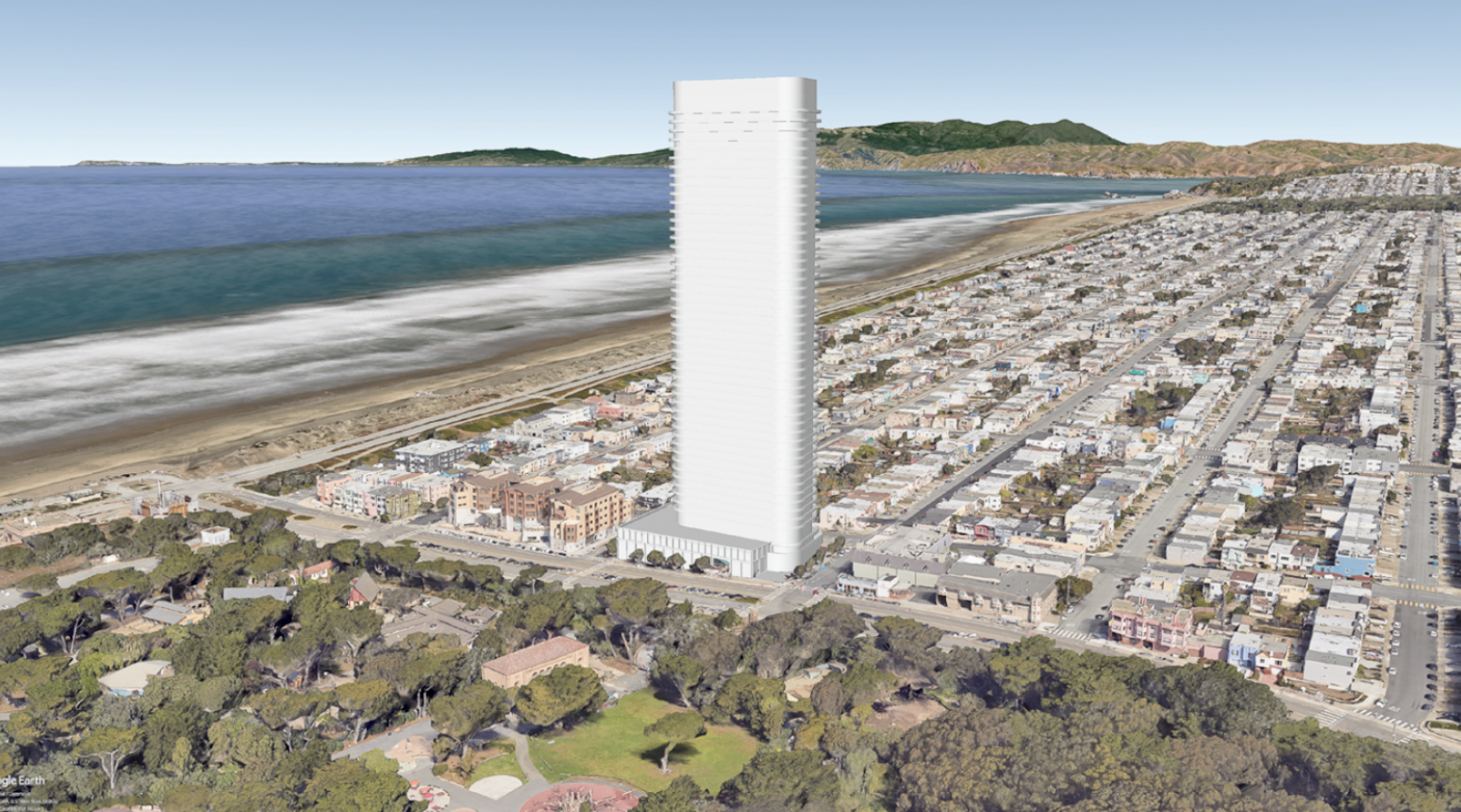No matter the issue, there are always those who push ideas to their logical extreme. That’s happening now in the ever-controversial topic of housing.
Beleaguered San Francisco is facing attempts to build a 50-story, 712-unit apartment tower in the city’s Sunset District. The behemoth would be erected in a neighborhood with mostly single-family homes near Ocean Beach across Sloat Boulevard from the San Francisco Zoo.
A rendering of the 50-story skyscraper proposed for 2700 Sloat Boulevarf – Illustration by Solomon Cordwell Buenz/SFYIMBY
It might be appropriately called the Wiener Tower, referring to “Senator Housing,” aka state Sen. Scott Wiener, a Democrat representing San Francisco.
The proposed skyscraper is the result of a series of landmark laws passed by the California state Legislature undermining county, city and voter control over the planning and construction of new housing. Wiener, the effort’s legislative champion, was aided and abetted by a bipartisan legislative majority.
These legislators are mostly sincerely convinced that state government action can somehow reverse the state’s high cost of housing. Their resolve in favor of gutting local control and abolishing single-family home zoning was bolstered by large campaign contributions from development interests, large property owners, speculators and building and construction trades unions.
Most who’ve seen renderings of the proposed Sunset District “Tower of Babel” agree that its location is inappropriate. That includes Wiener who imaginatively denies that his “build, baby, build” statutes led to outcomes so obnoxious to his constituents.
The timing is bad for Wiener as he, like every ambitious San Francisco politician, aspires to succeed Rep. Nancy Pelosi, the city’s elected member of Congress, when she eventually retires from the House of Representatives.
Wiener Tower is a message to California coastal counties, including Marin, that if planning and zoning laws are so weakened as to permit a 50-story monstrosity in Wiener’s hometown, then something similar could be proposed here.
The proposals might not be as outrageous, but if Wiener Tower gets traction, any Marin community could be the site for a 20-story version. Think of one with spectacular bay views sited in Tiburon, Sausalito, Larkspur Landing or Mill Valley’s bayfront.
It’s noteworthy that North Bay-North Coast state Sen. Mike McGuire (D-Geyserville) supported many of those legislative efforts. That includes Assembly Bill 2345 which amended the state’s density bonus law enabling the potential wave of more proposals like Wiener Towers.
Most Californians agree the state needs more housing for low- and moderate-income residents. Wiener’s efforts make only a small dent in that desperately needed category while facilitating construction of countless million dollar-priced market-rate homes.
Wiener’s contingent blithely ignores the “housing justice” movement’s calls for far more affordable and less market-rate luxury homes. The latter contribute to the gentrification of lower income neighborhoods.
Marin’s Susan Kirsch, the leader of the Community Catalysts for Local Control group, the state’s top advocate for the concerns of suburban towns and less-dense urban neighborhoods says, “We must identify and use multiple tools in our toolbox. I’m cautious of the ‘once and for all’ or ‘this is the only solution’ rhetoric.”
Here are Kirsch’s list of tools:
• Litigation, legislation and lobbying: Faulty assumptions have led to misguided bills. Poor policy puts local constituents at risk of fire and flooding danger. That would be avoided with a balance of local control.
• Promote a statewide audit of California’s Department of Housing and Community Development.
• It is key to find, elect and support good candidates against the pressures in Sacramento.
• Support local efforts through the revised group CitizenMarin, under the leadership of Amy Kalish; United Neighbors in Los Angeles; Coalition of San Francisco Neighborhoods; and dozens of similar local homeowner and neighborhood groups.
• Support the statewide ballot initiative promoted by the Our Neighborhood Voices group.
That ballot initiative was my preferred hope to restore reasonable local control, but it appears its promoters don’t have the funding or organization to pull it off.


Support SON-SF ~ Save Our Neighborhoods SF by SIGNING OUR PETITION to Fight this & STOP 2700 SLOAT BLVD project